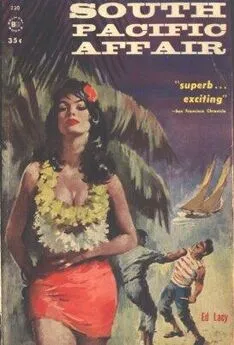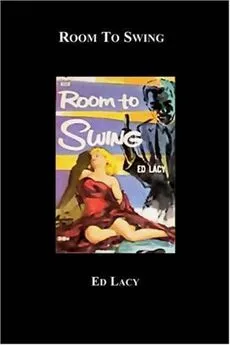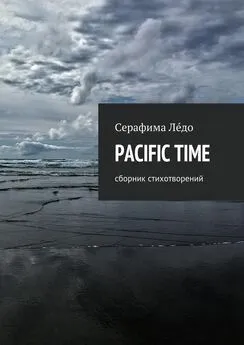Ed Lacy - South Pacific Affair
- Название:South Pacific Affair
- Автор:
- Жанр:
- Издательство:неизвестно
- Год:неизвестен
- ISBN:нет данных
- Рейтинг:
- Избранное:Добавить в избранное
-
Отзывы:
-
Ваша оценка:
Ed Lacy - South Pacific Affair краткое содержание
South Pacific Affair - читать онлайн бесплатно полную версию (весь текст целиком)
Интервал:
Закладка:
She pushed my hands from her shoulders.
“I love you,” I said.
“Do you, Ray, or is love merely a handy word?”
“No one really knows what love is, but as much as I understand it, I love you ...” I glanced past her face, saw the little perfume bottles on her dresser. “Do you like perfumes?”
Ruita gasped. Turning away from me, she asked fiercely, “Are we back to polite talk again, Mr. Jundson?”
“No, no. That is—perfumes were important in my... wife's life. I used to give her silly little bottles every payday.”
“They're not important in mine! We islanders bathe many times a day, have no need for covering dirt and odors! I never used these, bought them long ago in Sydney—a whim.”
“Milly never used hers for another reason. She didn't want the odor to remain in her ... lover's bed. His wife might have found out. It's a cute little yarn, all the way.”
“But if you've left her, never cared for her, then—why last night, Ray?”
“She had nothing to do with that I'm afraid to try living with you. I'm afraid I'll mess it up, make us both unhappy.”
She stood there, trying to figure it out. “Are you afraid because of our difference in color or—?”
“No, it isn't anything as stupid as that. It's—well, I love you so much I can't risk making you unhappy.”
“We could only bring joy to each other.”
I shook my head. “I wish I was sure of that, Ruita. I know myself and ... I can't explain it, it's mixed up in my mind. All I know is I can't chance hurting you.”
“Don't you think last night—now—hurts?”
“A tiny hurt compared to what messed-up lives can be. All I can tell you is that I'll try my best to come back to you.”
I reached over to kiss her and she slapped me hard across my face.
“Yes, Mr. Jundson, you'll try to come back to your native girl for a little fun. You'll expect her to be waiting!”
I grabbed her shoulders, and shook her. She began to cry. I held her close and kissed her. Her lips didn't respond. “Darling,” I whispered into her ear, “with us it has to be everything, all down the line or a bust-up. And if we messed up I'm not sure I could stand it, or that you could.”
She suddenly kissed me as hard as she could, her arms going around me like iron, her whole body alive and pressing. When I started to kiss her back, she pushed me away and said coldly, “Any time you return to Numaga, Mr. Jundson, we shall have copra waiting for you.”
She walked out of the room slowly and I stood there for a moment, then realized it was a little play to save face and I didn't blame her. I ran down to the beach.
It took us some time to make the Hooker ready, mainly because every time we were about to pull up anchor, some joker would come rushing out in his canoe with a request to deliver a note to his cousin or somebody in Papeete, or to see about buying this and that for him—although we hadn't said we'd return and this was the first visit we'd made to Numaga.
I was hoping Ruita would come down to see us off but she didn't. Some people paddled out to bring us a gift of coconut crabs which we tied to the rigging to keep fresh, and we kept horsing around so long I thought we'd miss the tide. I checked the bilge for gas fumes, got our old converted Buick motor working and then turned it off. “We've lost the tide,” I said.
“Naw, plenty of water. Get her going,” Eddie said as he pulled up anchor and took the wheel. We went over the reef, an angry rusty red beneath the surging water, without bumping the keel.
We hauled up the sails and the wind was good. I shut off the motor and let Eddie take the first watch since we were in an area of crazy currents. We didn't have any one method of standing watch. We were reasonable about it; each stood watch as long as he felt like it, then awoke the other. When we were a day or more away from any known islands or reefs, running before the steady trade winds, we'd lash the helm down and let the boat run herself.
Now as I sat atop the cabin and watched Ruita's island become a cloud on the horizon behind us, I felt proud of our boat. I'd really been lucky getting the cutter; she was a fine sea boat—forty-two feet over-all and thirty-two feet on the waterline, gaff-rigged, with a long pole bowsprit you rarely see these days. In fact, you rarely see a cutter like mine.
The Pacific was choppy and whenever we dipped into a gully of waves and lost some wind for a split second, the copra stench was sickening. We had a good boat, if a smelly one, probably never would luck up on any real money, yet for some unknown reason I wanted to be a seagoing bum rather than settle down with Ruita.
As Numaga disappeared on the horizon I tried to find the reason, but couldn't think of one that made sense. Eddie and I didn't have a bad life, nor a wonderfully good one; rather it was a painless way of passing time.
Still, living with Ruita would be just as carefree, and in many delightful ways even more so. Yet, while I was sure I could take life as a small-time trader, I was afraid to stick myself on some isolated island, even with a Ruita. Or was the real reason the fact that I was frightened of a second failure in marriage? Or was it that marrying Ruita would mean I'd stay in the islands forever? I kept telling myself I wanted to remain here for the rest of my days, but did I really?
Eddie leaned over the wheel and yawned, said, “Sure can't figure you and Ruita. A gal with everything—looks...”
“Why don't you shut up!”
He shrugged and we were on a silent kick for the rest of the day and most of the following morning.
Two days later when we were within sight of Tahiti, or rather the jagged outline of Moorea, Eddie opened the hold and, screwing up his tan face at the stench, removed a fifty-pound bag of copra. “This bag we hide—for drinking and movie money.”
“We haven't got much of a cargo as it is,” I began.
“Even if we brought in a full load of shell we'd still owe the Chinaman. He'll advance us trade goods against the next cargo, like he always does.”
“That's why we're always in debt.”
Eddie closed the hatch and held the bag at arm's length. “Ray, a lousy five or ten bucks ain't going to make us rich or poor, but it will mean a girl and I'm sure in need of one.”
“What was wrong with your, uh, dream girl back in Numaga?”
“That dream. She was kind of sloppy and it took me time to work up to it. Just when things were set this popaa came along, in the dream, spoiled everything. Guess I forgot to tell you that.”
Approaching Tahiti is one of the most beautiful sights in the world, although Papeete itself has some of the ratty atmosphere of a cheap carnival, a pitch show. With Moorea behind us, I got the motor going soon as we saw the beacon on Point Venus. We went through the pass and stopped at the tiny island of Motuiti opposite the Papeeta waterfront. In the old days the famous Queen Pomare used the island as a pleasure resort but now it's a quarantine and customs station.
There was a new officer on duty. I gave him our papers, our permit de sejour, and everything was in order. He took one look at Eddie's face, gasped, “Lion Face—you are a leper!”
Eddie ran into this one in every new port. His flattened nose, puffed lips, the ridge of scar tissue over his eyes, not to forget his wrinkled right “tin” ear, did give him a “Lion Face,” and you have the disease real bad when your face reaches that stage. Eddie explained about punches, not bugs, changing his face, but the quarantine office hadn't the slightest idea what a pug was and refused to let us go. Happily, as Eddie was getting angry, one of the old hands came in and okayed our papers.
As the sun was setting, trimming Moorea's rugged peaks with fire, I started the motor and we backed the Hooker into the quay and made her fast. The nearest ship to us was a very big schooner, the Shanghai, supposedly owned by a senile Tahitian who lived in a rum bottle and was a front for a Swede named Buck and a sharp Chinese supercargo named Tom Teng. Buck was in his late fifties, a wide powerful man with an odd face—the upper half seemed to run directly down to the tip of his big nose and gave him a kind of Andy Gump appearance. He and Teng were big traders, operators who ran booze and hired their own divers for mother-of-pearl shell.
The short tropical twilight is when most islanders take their last bath of the day. We had a swim and finished the last of the crabs tied to the rigging. Eddie cursed the quarantine man, because now was it too late to sell the bag of copra. We washed the deck down and I said I was going ashore anyway, just to walk among people. Eddie said, “Not me. Nothing worse than walking by the bars and girls without a franc in your pockets, like a hungry dog. I'd rather—”
There was some shouting aboard the Shanghai, followed by drunken laughter, and then a splash as somebody either dove off the high schooner or was thrown off.
In the dim light we could see a person swimming toward our boat and a moment later a hand grasped the rope ladder and a girl pulled herself aboard, flopped on the deck like a caught fish. She was buck naked, slim, with a rather plain and pretty face. She pressed the water out of her long black hair as she sat up. She was both drunk and angry. Looking toward the schooner, she shouted curses in French, then stood up and grinned at us.
She was about seventeen and for sheer physical beauty the most perfectly shaped girl I'd ever seen. She belched slightly, shivered with the night air, her pointed breasts dancing. She giggled, showing stubby teeth, then walked gracefully and casually down the cabin steps, telling us in Tahitian, “I am cold. After a good drink and some clothes, you can be my friends.”
She disappeared into the cabin and Eddie stared at me with open mouth, then asked, “Still going ashore?”
“You crazy?” Absentmindedly I searched my pockets for a coin, then took Eddie's knife from his belt and tossed it in the air.
He said, “Trade-mark up!” as I got out my lighter and we knelt to look at the knife.
The plain side was showing and I ran for the cabin.
Chapter II
I was passing Les Dames de Saint Joseph de Cluny, the Catholic girl's school in Papeete, and a number of the youngsters in neat smocks were out walking. Some of them smiled politely at me. I clicked my heels and slipped them a smart bow which caused the sister in charge to grin and the kids to giggle.
It was the start of a bright cool day and I was feeling very fine; for the moment I wasn't worrying about a thing, not even thinking of Ruita. Last night had been the South Seas of the phony books, the stuff Barry and I had bulled about in Chicago bars—you're on your own little ship and a beautiful girl comes to spend the night with you; a few good hours and it's all over and on to the next one. Wam-bam and thank you, Ma'am.
Her name was Heru and she had arrived in Papeete some five months ago from a far-away atoll, down near Easter Island. As I walked along I thought about her and why she was here. The atoll people are not only well supplied by nature with about everything they need, but each family averages some fifteen hundred dollars a year from shell and copra, working at it when ever they feel in the mood. But most of the atoll people leave their heaven as soon as they can—that's always puzzled me. The men ship over the world as sailors, while the girls rush to Papeete to whore, either as amateurs or as pros. In fact (I am told) many of them actually can be found hustling in Paris, which is certainly a long way to travel to walk a shabby street.
Читать дальшеИнтервал:
Закладка:










